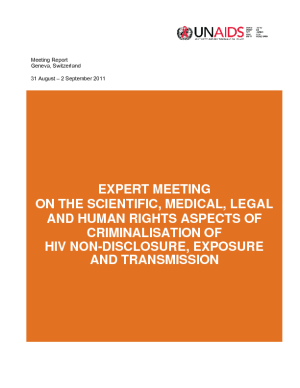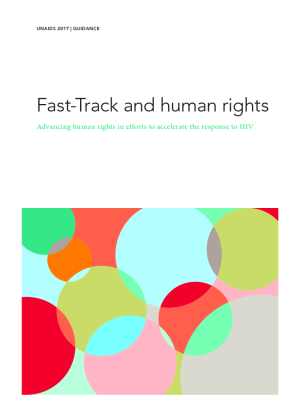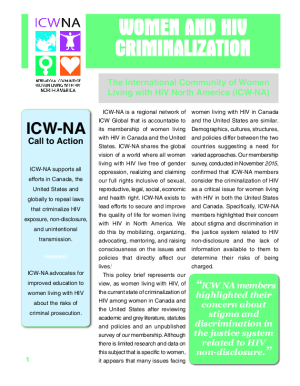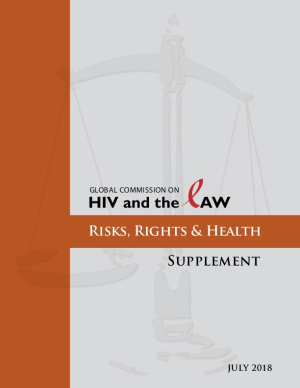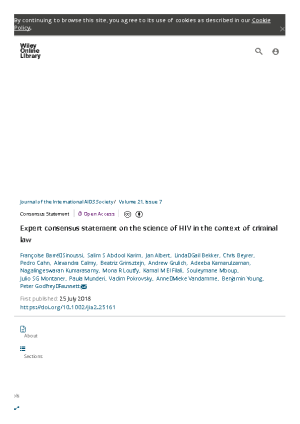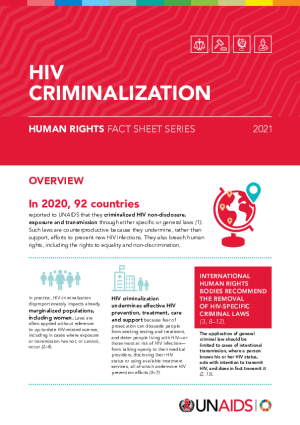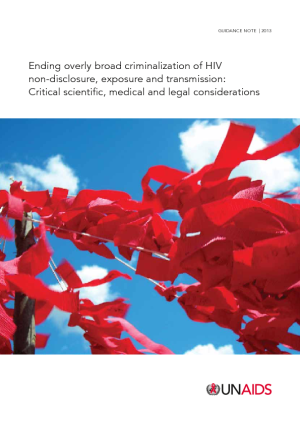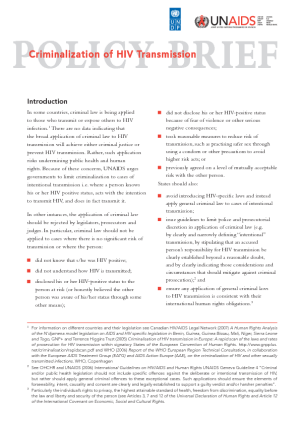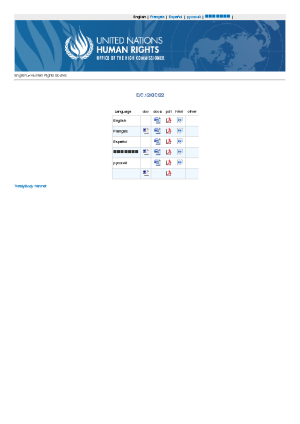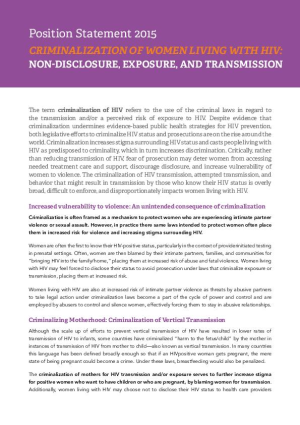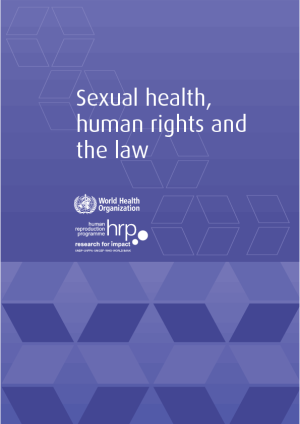This report contains the views, opinions and suggestions for policy orientation and formulation of the participants at an expert meeting (convened on 31 August–2 September 2011 in Geneva, Switzerland) that brought together scientists, medical practitioners and legal experts in order (i) to consider the latest scientific and medical facts about HIV that should be taken into account in the context of criminalisation, and (ii) to explore how to best address issues of harm, risk, intent and proof—including alternative responses to criminalisation—in light of this science and medicine.
International Organisations
For more than a decade, UN and other international agencies have recognised HIV criminalisation as a global concern, calling for review of legal frameworks and the use of laws to target HIV.
Fast Track and Human Rights – Advancing human rights in efforts to accelerate the response to HIV
Spells out for the first time (on p23) that there must be “Non-criminalization of mother-to-child transmission” when a country applies for validation for the elimination of mother-to-child transmission of HIV. This marks the first time in public health history that human rights guarantees are considered a prerequisite to validating disease elimination.
Women and HIV criminalization
This policy brief represents the view, as women living with HIV, of the current state of criminalization of HIV among women in Canada and the United States after reviewing academic and grey literature, statutes and policies and an unpublished survey of membership. ICW-NA members highlighted their concern about stigma and discrimination in the justice system related to HIV non-disclosure.
Risks, Rights & Health – Supplement
This Supplement highlights developments since 2012 in science, technology, law, geopolitics, and funding that affect people living with or at risk from HIV and its coinfections. The recommendations add to and amplify those of the Commission’s 2012 report Risks, Rights & Health, which remain as relevant as they were six years ago.
- Alternative links
- Russian,
Expert consensus statement on the science of HIV in the context of criminal law
Twenty scientists from regions across the world developed this Expert Consensus Statement to address the use of HIV science by the criminal justice system. Description of the possibility of HIV transmission was limited to acts most often at issue in criminal cases. The authors recommend that caution be exercised when considering prosecution, and encourage governments and those working in legal and judicial systems to pay close attention to the significant advances in HIV science that have occurred over the last three decades to ensure current scientific knowledge informs application of the law in cases related to HIV.
- Alternative links
- Expertní prohlášení k vědeckým poznatkům o HIV v kontextu trestního práva ,
HIV Criminalization – Human Rights Fact sheet Series
Series of fact sheets on human rights highlighting the critical need to scale up action on rights. Short, easy to digest and accessible document outlining the latest epidemiology, the evidence of the impact of human rights interventions, the latest targets, and international guidelines, recommendations and human rights obligations.
Other factsheets in the same series released in June 2021 include: HIV and people who use drugs, HIV and gay men and who have sex with other men, HIV and transgender and other gender-diverse people, HIV and sex work, HIV and people in prisons and other closed settings and HIV and stigma and discrimination.
Ending overly broad criminalisation of HIV non-disclosure, exposure and transmission: Critical scientific, medical and legal considerations
Restates UNAIDS’ position on criminalisation and makes specific recommendations to help governments, policy-makers, law enforcement officials, and civil society limit the overly broad application of criminal law to HIV.
- Alternative links
- Spanish / Español
Criminalization of HIV transmission Policy Brief
Urges governments to limit criminalisation of HIV to cases of intentional transmission. Argues that criminal law should not be applied in a range of circumstances, including where there is no significant risk of transmission.
- Alternative links
- French/Français
HIV and the Law: Risks, Rights and Health
Presents coherent and compelling evidence base on human rights and legal issues relating to HIV, including commentary and recommendations. Chapter 2 (pages 21-25) covers HIV criminalisation.
General Comment No. 22 (2016) on the Right to sexual and reproductive health (article 12 of the International Covenant on Economic, Social and Cultural Rights).
Includes comment (at page 40) that States must reform laws that impede the exercise of the right to sexual and reproductive health. Examples include laws criminalizing non-disclosure of HIV status, and exposure to and transmission of HIV.
- Alternative links
- Spanish / Español, Russian / Русский
Report of the Special Rapporteur on the right of everyone to the enjoyment of the highest attainable standard of physical and mental health
Commentary includes clear statements outlining many ways that criminalisation undermines effective HIV response.
Oslo Declaration on HIV Criminalisation
Outlines the importance of a cohesive, evidence-informed approach to use of criminal law relating to HIV non-disclosure, exposure and transmission. Urges Ministries of Health and Justice, public health officials, policymakers and criminal justice system actors to ensure a proportionate response to HIV transmission risk.
International Community of Women Living with HIV (ICW) Position Statement on Criminalization of Women Living with HIV
Argues that criminalisation of women living with HIV for non-disclosure, exposure or transmission undermines public health strategies and increases risk of violence against women. Includes recommendations.
Sexual health, human rights and the law
Considers States’ obligations to bring laws and regulations affecting sexual health into alignment with human rights laws and standards. Includes recommendations on HIV criminalisation.
